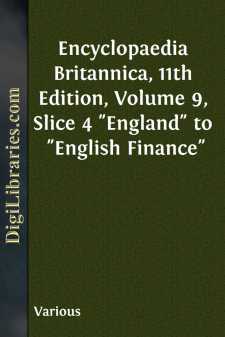Categories
- Antiques & Collectibles 13
- Architecture 36
- Art 48
- Bibles 22
- Biography & Autobiography 813
- Body, Mind & Spirit 142
- Business & Economics 28
- Children's Books 17
- Children's Fiction 14
- Computers 4
- Cooking 94
- Crafts & Hobbies 4
- Drama 346
- Education 46
- Family & Relationships 57
- Fiction 11829
- Games 19
- Gardening 17
- Health & Fitness 34
- History 1377
- House & Home 1
- Humor 147
- Juvenile Fiction 1873
- Juvenile Nonfiction 202
- Language Arts & Disciplines 88
- Law 16
- Literary Collections 686
- Literary Criticism 179
- Mathematics 13
- Medical 41
- Music 40
- Nature 179
- Non-Classifiable 1768
- Performing Arts 7
- Periodicals 1453
- Philosophy 64
- Photography 2
- Poetry 896
- Political Science 203
- Psychology 42
- Reference 154
- Religion 513
- Science 126
- Self-Help 84
- Social Science 81
- Sports & Recreation 34
- Study Aids 3
- Technology & Engineering 59
- Transportation 23
- Travel 463
- True Crime 29
The Atlantic Monthly, Volume 16, No. 97, November, 1865
by: Various
Categories:
Description:
Excerpt
WHY THE PUTKAMMER CASTLE WAS DESTROYED.
There is a test of truth in popular creeds and in human opinions generally which is prominently put forward by Herbert Spencer, and has been more or less distinctly stated by other writers, long before our time,—a very searching and trustworthy test.
It is, in substance, this:—Whatever doctrine or opinion has received, throughout a long succession of centuries, the common assent of mankind, may be properly set down as being, if not absolutely true in its usually received form, yet founded on truth, and having, at least, a great, undeniable verity that underlies it.
If, however, there be conflicting details as to any doctrine, varying in form according to the sect or the nation that entertains it, then the test is to be received as affirming the grand underlying truth, but not as proving any of the conflicting varieties of investment in which particular sects or nations may have chosen to clothe it.
Thus of the world's belief in the reality of another life, and in the doctrine of future reward and punishment.
In some form or other, such a faith has existed in every age and among almost every people. Charon and his boat might be the means of conveyance. Or the believer, dying in battle for the creed of the Faithful, might expect to wake up in a celestial harem peopled with Houris. Or the belief might embody the matchless horrors painted by Dante; his dolorous city with the terrible inscription over its entrance-gate: "Lasciate ogni speranza, voi ch'entrate."
Again, the conception might be of a long unconscious interval after death, succeeded at last by a resuscitation; or it might be of another world, the supplement and immediate continuation of this, into which Death, herald, not destroyer, ushers us even while human friends are yet closing our eyes and composing our limbs. It might be of the Paradise in which, on the very day of the crucifixion, the penitent thief was to meet the Saviour of mankind; or it might be of that Heaven, yet increate or unpeopled, seen by some in long, distant perspective, shadowed forth in such lines as these:—
"That man, when laid in lonesome grave,Shall sleep in Death's dark gloom,
Until the eternal morning wake
The slumbers of the tomb."
Yet again, the idea may be of a Future of which the denizens shall be, on some Great Day, tried as before an earthly court, doomed as by an earthly tribunal, and sentence pronounced against them by a presiding God, who, of his own omnipotent will, decides to inflict upon sinners condign punishment, in measure far beyond all earthly severity,—torment in quenchless flames, with no drop of water to cool the parched tongue, for ever and ever.
In other words, we may conceive, as to human destiny in another world, either of punishments optional and arbitrary, growing out of the indignation of an offended Judge who hates and requites sin, or of punishments natural and inherent, growing out of the very nature of sin itself, as delirium tremens requites a long career of intemperance. We may conceive of punishments which are the awards of judicial vengeance; or we may believe in those only which are the inevitable results of eternal and immutable law, a necessary sequence in the next life to the bad passions and evil deeds of this.
Those who incline to this latter aspect of the Great Future, as the scene of reward or punishment supervening in the natural order of things, may chance to find interest, beyond mere curiosity, in the following strange narrative.
There is not, perhaps, a country more rife in legends of haunted houses than Germany. No province but has its store of them. Many, drawn by tradition from the obscurity of the past, have lost, if they ever possessed, any claim to be regarded except as apocryphal. But others, of a recent date and better attested, cannot be disposed of in so summary a manner.
In furnishing a specimen of this latter class, I depart from a rule which I think it well to observe in regard to original narratives of character so marvellous: to record such, namely, only when they can be procured direct from the lips of the witnesses themselves. This comes to me at second hand. I had no opportunity of cross-questioning the actors in the scenes narrated. Yet I had the story from a gentleman of high respectability: the principal Secretary of the —— Legation at Naples: and his sources of information were direct and authentic.
In the southeastern portion of Pomerania, at no great distance from the frontier of the province of West Prussia, and in the vicinity of the small town of Bütow, there stood, not many years since, an ancient château. It was the ancestral residence of an old Pomeranian family of baronial rank; and the narrative of its destruction, with the causes which led thereto, is curious and remarkable.
Its former owner, the Baron von Putkammer, after leading a wild and dissolute life, had expired within its walls. For years previously, many a mysterious story, fraught with dark hints of seduction and infanticide, had been whispered over the surrounding country; and when at last death arrested the Baron's profligate career, some reported that he had been strangled in requital of outrage committed,—others, that the Devil had taken home his own, as they had long expected....












